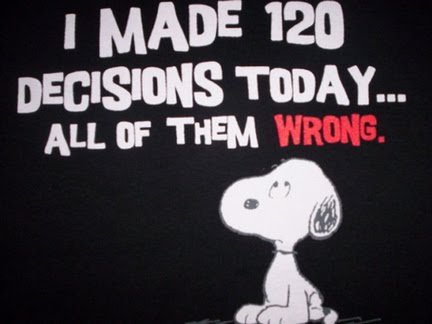I love leadership as a concept, because it means about 12,391 things to 1,435 different people (obviously those numbers are completely made up), and entire aisles of bookstores are devoted to it and people fly all over the world to speak on it and capture it, but it’s really actually a pretty simple thing.
Now, moving one step further — every single person on the planet who’s ever had a job, even those who absolutely adore their boss, has had moments where they don’t quite understand why their boss is deep in the minute details of something. After all, aren’t bosses supposed to think at a higher level? So why are they down in the weeds doing copy edits or writing tweets? I’ve had bosses do this, I’ve had friends tell me their bosses do it, I’ve had bosses admit to me they do it, etc. It’s pervasive.
(What’s interesting is that most everyone who ever becomes a boss was, at one point, a rank-and-file employee. They probably complained about those behaviors, then went and did them when they became a manager. Brutal cycle.)
So … we often think of this idea of “leadership” as “You have the influence now, so every decision should be running through you.” If you asked a random person on the street to list traits of a leader, I bet they wouldn’t get very far before they said “… decision-making.” So we think of our strong, powerful leaders as the real decision-makers in our organizations, generally.
But what if leadership is actually about making as few decisions as possible?
That’s the idea Reed Hastings puts forth here.
Now, I’m not a top exec at Netflix, so I don’t know. This could all be BS. He could be a super micro-manager for his direct reports, and then just say stuff like this in interviews. Anything’s possible, of course. But Netflix is a $23 billion company (not bad), and it did “disrupt” one of the most conventional ways of middle-class existence (the television). So he knows something.
Here’s a quote that’s interesting:
“I take pride in making as few decisions as possible, as opposed to making as many as possible,” Hastings says. One example: Netflix’s decision to produce the popular House of Cards was a huge one, but the meeting that gave the project a green light lasted just 30 minutes. Others had already laid down the groundwork and details, making it easy for Hastings to sign off. “It’s creating a sense [in your employees] that ‘If I want to make a difference, I can make a difference.’” Freedom is only one part of the Netflix culture; the other is responsibility. Netflix, says Hastings, has created a culture of high performance. “Adequate performance gets a generous severance package,” he says, adding that “we turn over a lot of people.”
Stop and think about this for a second: the ultimate decision to do House of Cards took about 30 minutes. I bet, in the past week, you sat in a meeting about something meaningless — certainly not a cool TV show that won awards — and the littlest decision about that topic took well over an hour. Am I right?
My broader point here: when you become a leader, that doesn’t actually mean you need to be involved with every decision. It really means you should have empathy for your team, provide them with purpose and the resources they need to grow, and then sit back and approve the big-ticket items, sure — but not get down in the weeds on every single decision. That’s actually the opposite of what leadership is; that’s simply managing, and managing/leadership are inherently different concepts.

Stoopid as this got-to-be-involved-in-all-the-decisions mentality is – and it really is, because adding decision-making gatekeepers to a process slows things down, and making a lot of decisions come down to a single gatekeeper basically destroys the power of a variety of ideas and viewpoints in a system – I get why it can happen…because it’s terrifying to trust folks with important decisions that may have an impact on your life/reputation/bonus/whatever.
I feel that myself all the time, and I KNOW I shouldn’t have much decision-making input, given my time-consuming maximizing ways and my unfriendliness towards deadlines…
Anyhoo, way I see it is this: the job of the big decisionmaker is to make those rare big decisions that make it easier and quicker for other folks to be able to make other decisions without Big Decisionmaker’s input. Basically, decide to get the heck out of the way most of the time, and let the rest of the troops get on with it.
Easier said than done, of course…
So few people understand this part of what the role of a “decision-maker” needs to actually be.